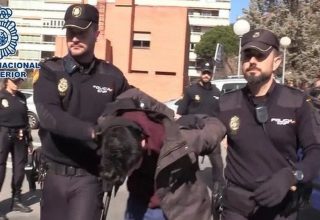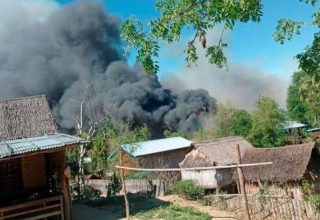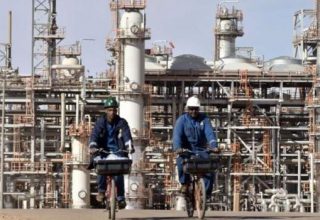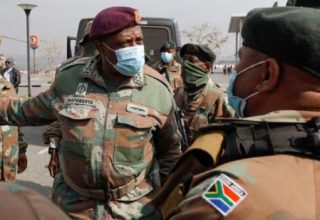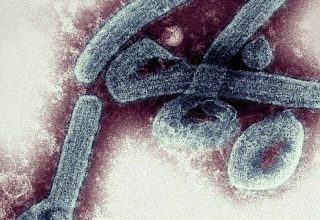
Soldiers who ousted Mali’s President Ibrahim Boubacar Keïta say they plan to set up a civilian transitional government and hold new elections.
The spokesman for the soldiers said they had acted to prevent the country falling further into chaos.
President Keïta resigned on Tuesday night saying he did not want “blood to be spilled to keep me in power”.
The UN Security Council condemned the “mutiny”, urging the immediate release of the president and his officials.
All troops should “return to their barracks without delay”, it said.
The African Union (AU) voted to suspend Mali. Its 15-member security council called for the “restoration of constitutional order” and the release of the president and other government officials.
Mali, a vast country stretching into the Sahara Desert is among the poorest countries in the world and has experienced several military takeovers. It is currently battling to contain a wave of jihadist attacks and ethnic violence.
What have the soldiers said?
The soldiers, calling themselves the National Committee for the Salvation of the People, said they did not want to stay in power.
“We are keen on the stability of the country, which will allow us to organise general elections to allow Mali to equip itself with strong institutions within the reasonable time limit,” said the group’s spokesman, Col Ismaël Wagué, the air force deputy chief of staff.
In a televised statement, flanked by soldiers, he urged Mali’s civil and political groups to help create a “political transition leading to credible general elections for the exercise of democracy through a roadmap that will lay the foundations for a new Mali”.
He also announced the closure of all air and land borders and a curfew from 21:00 to 05:00.
“Our country is sinking into chaos, anarchy and insecurity mostly due to the fault of the people who are in charge of its destiny,” he said.
What did Mr Keïta say?
Wearing a surgical mask amid the coronavirus pandemic, Mr Keïta resigned in a brief address on state television on Tuesday evening.
“If today, certain elements of our armed forces want this to end through their intervention, do I really have a choice?” he asked. “I hold no hatred towards anyone, my love of my country does not allow me to. May God save us.”

Mr Keïta won a second term in elections in 2018, but since June has faced huge street protests over corruption, the mismanagement of the economy and a dispute over legislative elections.
There has also been anger among troops about pay and the conflict with jihadists.


It was the war in Libya, almost a decade ago, that nudged Mali along the path to chaos.
Weapons from Libya flooded across the Sahara Desert, fuelling a separatist conflict in northern Mali, which morphed into an Islamist militant offensive, which prompted a coup in the capital Bamako.
It’s been a mess ever since, in a landlocked nation that had been a West African success story.
Today French troops, American drones, UN peacekeepers, and British helicopters are all trying – and largely failing – to strengthen security, not just in Mali, but across a vast region increasingly threatened by Islamist insurgencies and other conflicts.
This latest military coup in Bamako appears to be a reaction to those security challenges, but also to corruption, disputed elections, and political drift.
The coup itself seems unlikely to fix anything.
But it highlights a familiar truth – that while foreign intervention has its uses, the key to repairing a nation like Mali lies in its own hands, and with its own faltering democratic institutions.

What’s the mood in Bamako?
Journalist Mohamed Salaha told the BBC that banks and offices were closed on Wednesday but some daily activities were slowly resuming.
A small group gathered outside the Independence Monument to celebrate, while some opposition activists detained during the recent street protests have been freed.
However, some people are also worried about the future as it is not clear who is in charge of the country, he said.
What do we know about the mutiny?
It appears that mutinying soldiers took control of the Kati army camp, about 15km (nine miles) from Bamako, on Tuesday. They then marched on the capital, cheered by crowds who had gathered to demand Mr Keïta’s resignation.

![]()
The soldiers then stormed the presidential buildings, arresting Mr Keïta and his prime minister and taking them to Kati Camp. The president’s son, the speaker of the National Assembly, the foreign and finance ministers were also reported to have been detained.
It remains unclear how many soldiers took part in the coup, although it seems to have been led by Col Malick Diaw – deputy head of the Kati camp – and another commander, Gen Sadio Camara, BBC Afrique’s Abdoul Ba reports from Bamako.
Who is behind Mali’s coup?
What has the reaction been?
The AU’s Commissioner for Peace and Security, Smail Chergui, said military coups were “something of the past which we cannot accept anymore”.
“Whenever you have a crisis and the military people have a coup and say ‘We are responding to the will of the people’, this way of responding is not acceptable at all,” he told BBC’s Focus on Africa programme.
The Economic Community of West African States (Ecowas), a regional body, said its 15 member states had agreed to close their borders with Mali, suspend all financial flows to the country, and eject Mali from all Ecowas decision-making bodies. In recent months, Ecowas has been trying to mediate between Mr Keïta’s government and opposition groups.
The US Secretary of State Mike Pompeo tweeted his condemnation of the “mutiny”:
 Mali’s former colonial ruler, France, was also quick to condemn the president’s detention, and Foreign Minister Jean Yves Le Drian urged the soldiers to return to barracks.
Mali’s former colonial ruler, France, was also quick to condemn the president’s detention, and Foreign Minister Jean Yves Le Drian urged the soldiers to return to barracks.
A member of Mali’s opposition M5 movement, which has held protests against Mr Keïta for the past few weeks, welcomed his resignation.
Prof Ramata Sissoko Cisse told the BBC World Service: “I think it’s a relief for the Malian people and for all the citizens of Mali to finally hear from the president that because of the lack of support of the Malian people he finally accepts to resign, to give back power to the people.”
M5 is led by the conservative Imam, Mahmoud Dicko, who has called for reforms after rejecting concessions from Mr Keïta.
- The popular imam taking on Mali’s president

The events which led to the coup:
- 2018: President Ibrahim Boubacar Keita re-elected for a second term
- 2019: Prime Minister Soumeylou Boubeye Maiga and his government resign following an upsurge of ethnic violence
- March 2020: Opposition leader Soumaila Cisse kidnapped as he campaigns ahead of parliamentary elections
- 30 April: Constitutional court overturns some parliamentary election results amid fraud allegations
- May: Opposition coalition led by popular Iman Mahmoud Dicko calls for President’s Keïta’s resignation
- June: Ecowas calls for creation of a “consensus government of national unity” following massive opposition street protests
- 10 July: At least 10 people killed after opposition supporters clash with security services
- 18 August: Mutinying soldiers carry out a coup
Source: BBC




